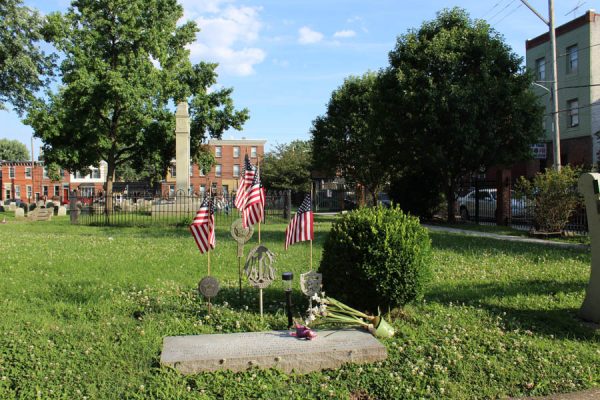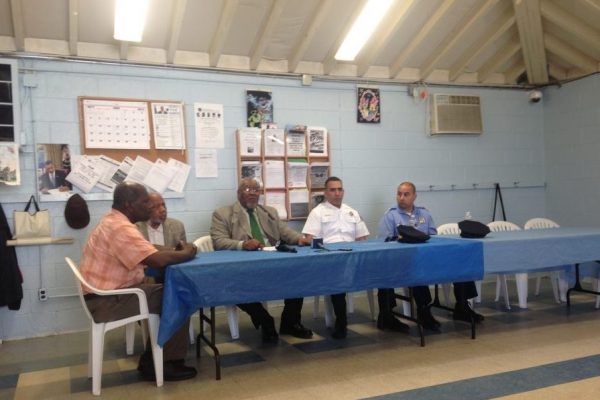Fairmount Civic Association Discusses Delinquent Taxes and NFL Draft at Monthly Meeting
Taxes and traffic were the main focus of remarks from two at-large Philadelphia councilmen at the January meeting of the Fairmount Civic Association on Thursday, January 27.
Councilman Allan Domb said delinquent real estate taxes in the city total $492 million. He explained that those delinquencies are on approximately 8,900 properties worth a total of $134 billion and taxable for $91 billion. But he said 6,900 of the property owners owe less than $4,000.
From a somewhat brighter angle, he noted that 55 percent of those in delinquency will pay the amount due upon the first delinquency notice from the city. He also said less than 0.5 percent of delinquent properties are in foreclosure. And he said delinquent taxpayers are in the distinct minority. Only eight percent don’t pay, while 92 percent do.
On the flip side of money flowing from government coffers to citizens, Domb said few eligible Philadelphians take advantage of the Internal Revenue Service’s Earned Income Tax Credit (EITC), a refundable tax credit for low- to moderate-income working individuals and couples, particularly those with children.
Domb said there are 400,000 homes in Philadelphia in poverty, and 4,000 in extreme poverty, but most of the $100 million EITC money earmarked for Philadelphia by the IRS goes unclaimed.
Domb, who was elected last year, also said he would like to eliminate the city’s Delayed Retirement Option Plan (DROP) program, under which a city worker nearing retirement age can name a future retirement date and immediately start accruing pension benefits in an interest-bearing account, then collect that money when they do retire, in addition to their full pension. The move was made in 1999 during the Rendell administration to keep top talent on the job longer. But a study by Boston College found that DROP cost the city $258 million because some people were timing their projected retirement dates to be able to collect optimal DROP and pension benefits. Additionally, some people who had taken advantage of the one-time payout were returning to work after a short recess and drawing a full salary again.
And in addition to those workers drawing wages, Domb said for every dollar paid to a city worker, the city pays 71 cents in benefits.
City Councilman-at-large Bill Greenlee told attendees of the meeting that the Benjamin Franklin Parkway will be blocked off the last weekend of April due to the National Football League’s draft, which will be held in front of the Art Museum’s steps. The draft itself will happen on Thursday, Friday and Saturday, but the Parkway will be closed the entire week for events and exhibits for the public.
He also said the League will reimburse the city for expenses incurred by the event including staging and infrastructure.
Zoning variances for three properties in Fairmount were also presented to obtain a letter of non-opposition from the FCA to present to the Zoning Board. The owner of 926 N. 29th St. wants to turn a large two-story single-family home into a two-unit structure. But that property is zoned for single-unit homes only.
At 837 N. 21st St., the owner wants to replace an existing free-standing deck behind the house with a small greenhouse. The owner of 2817 Parrish St. would like to add a second story to an existing single-story structure that extends behind the two-story house. In these two cases a variance is required because the remaining yard space is less than required by code. Although, that requirement is already breached by the existing structures.
Because only a few immediate neighbors were present to offer their thoughts on the projects, a consideration of non-opposition letters was delayed until more neighbors could speak on the projects.
FCA president Larry Reynolds said he had talked with City Councilman-at-large David Oh about claiming public parking spaces to be dedicated as restricted for electric vehicles. He said the same rules for claiming handicapped parking spaces would apply. That is, in a block with single-side parking less that 50 feet long, no more that two spaces would be allowed. Up to four such spaces would be in blocks longer than 500 feet.
Reynolds said the dedicated spaces can be no longer than 20 feet, and he added that a typical parking space is 16 feet long. Some FCA members were concerned that an electric space could take away one of the permitted dedicated spots needed by a disabled person. •







